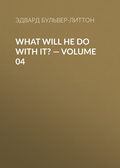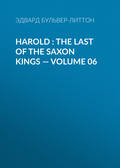
Эдвард Бульвер-Литтон
Godolphin, Complete
CHAPTER LV
THE DEATH OF GEORGE IV.—THE POLITICAL SITUATION OF PARTIES, AND OF LADY ERPINGHAM
The death of George the Fourth was the birth of a new era. During the later years of that monarch a silent spirit had been gathering over the land, which had crept even to the very walls of his seclusion. It cannot be denied that the various expenses of his reign,—no longer consecrated by the youthful graces of the prince, no longer disguised beneath the military triumphs of the people,—had contributed far more than theoretical speculations to the desire of political change. The shortest road to liberty lies through attenuated pockets!
Constance was much at Windsor during the king’s last illness, one of the saddest periods that ever passed within the walls of a palace. The memorialists of the reign of the magnificent Louis XIV. will best convey to the reader a notion of the last days of George the Fourth. For, like that great king, he was the representation in himself of a particular period, and he preserved much of the habits of (and much too of the personal interest attached to) his youth, through the dreary decline of age. It was melancholy to see one who had played, not only so exalted, but so gallant a part, breathing his life away; nor was the gloom diminished by the many glimpses of a fine original nature, which broke forth amidst infirmity and disease.
George the Fourth died; his brother succeeded; and the English world began to breathe more freely, to look around, and to feel that the change, long coming, was come at last. The French Revolution, the new parliament, Henry Brougham’s return for Yorkshire, Mr. Hurne’s return for Middlesex, the burst of astonished indignation at the Duke of Wellington’s memorable words against reform, all betrayed, while they ripened, the signs of the new age. The Whig Ministry was appointed, appointed amidst discontents in the city, suspicions amongst the friends of the people, amidst fires and insurrections in the provinces;—convulsions abroad, and turbulence at home.
The situation of Constance in these changes was rather curious; her intimacy with the late king was no recommendation with the Whig government of his successor. Her power, as the power of fashion always must in stormy times, had received a shock; and as she had of late been a little divided from the main body of the Whigs, she did not share at once in their success, or claim to be one of their allies. She remained silent and aloof; her parties were numerous and splendid as ever, but the small plotting reunions of intriguers were suspended. She hinted mysteriously at the necessity of pausing, to see what reform the new ministers would recommend, and what economy they would effect. The Tories, especially the more moderate tribe, began to court her: the Whigs, flushed with their triumph, and too busy to think of women, began to neglect. This last circumstance the high Constance felt keenly—but with the keenness rather of scorn than indignation; years had deepened her secret disgust at all aristocratic ordinances, and looking rather at what the Whigs had been than what, pressed by the times, they have become, she regarded them as only playing with democratic counters for aristocratic rewards. She repaid their neglect with contempt, and the silent neutralist soon became regarded by them as the secret foe.
But Constance was sufficiently the woman to feel mortified and wounded by that which she affected to despise. No post at court had been offered to her by her former friends; the confidant of George the Fourth had ceased to be the confidant of Lord Grey. Arrived at that doubtful time of life when the beauty although possessing, is no longer assured of, her charms, she felt the decay of her personal influence as a personal affront; and thus vexed, wounded, alarmed, in her mid-career, Constance was more than ever sensible of the peculiar disquietudes that await female ambition, and turned with sighs more frequent than heretofore to the recollections of that domestic love which seemed lost to her for ever.
Mingled with the more outward and visible stream of politics there was, as there ever is, a latent tide of more theoretic and speculative opinions. While the practical politicians were playing their momentary parts, schemers, and levellers, were propagating in all quarters doctrines which they fondly imagined were addressed to immortal ends. And Constance began to turn with some curiosity to these charlatans or sages. The bright countess listened to their harangues, pondered over their demonstrations, and mused over their hopes. But she had lived too much on the surface of the actual world, her habits of thought were too essentially worldly, to be converted, while she was attracted, by doctrines so startling in their ultimate conclusions. She turned once more to herself, and waited, in a sad and thoughtful stillness, the progress of things—convinced only of the vanity of them all.
CHAPTER LVI
THE ROUE HAS BECOME A VALETUDINARIAN.—NEWS.—A FORTUNETELLER
Meanwhile the graced Godolphin floated down the sunny tide of his prosperity. He lived chiefly with a knot of epicurean dalliers with the time, whom he had selected from the wittiest and the easiest of the London world. Dictator of theatres—patron of operas—oracle in music—mirror of entertainments and equipage—to these conditions had his natural genius and his once dreaming dispositions been bowed at last! A round of dissipation, however, left him no time for reflection; and he believed (perhaps he was not altogether wrong) that the best way to preserve the happy equilibrium of the heart is to blunt its susceptibilities. As the most uneven shapes, when whirled into rapid and ceaseless motion, will appear a perfect circle, so, once impelled in a career that admits no pause, our life loses its uneven angles, and glides on in smooth and rounded celerity, with false aspects more symmetrical than the truth.
One day Godolphin visited Saville; who now, old, worn, and fast waning to the grave, cropped the few flowers on the margin, and jested, but with sourness, on his own decay. He found the actress (who had also come to visit the Man of Pleasure) sitting by the window, and rattling away with her usual vivacity, while she divided her attention with the labours of knitting a purse.
“Heaven only knows,” said Saville, “what all these times will produce. I lose my head in the dizzy quickness of events. Fanny, hand me my snuff-box. Well, I fancy my last hour is not far distant; but I hope, at least, I shall die a gentleman. I have a great dislike to the thought of being revolutionised into a roturier. That’s the only kind of revolution I have any notion about. What do you say to all this, Godolphin? Every one else is turning politician; young Sunderland whirls his cab down to the House at four o’clock every day—dines at Bellamy’s on cold beef; and talks of nothing but that d–d good speech of Sir Robert’s’. Revolution! faith, the revolution is come already. Revolutions only change the aspect of society, is it not changed enough within the last six months? Bah! I suppose you are bit by the mania?”
“Not I! while I live I will abjure the vulgar toil of ambition. Let others rule or ruin the state;—like the Duc de Lauzun, while the guillotine is preparing, I will think only of my oysters and my champagne.”
“A noble creed!” said Fanny, smiling: “let the world go to wreck, and bring me my biscuit! That’s Godolphin’s motto.”
“It is life’s motto.”
“Yes—a gentleman’s life.”
“Pish! Fanny; no satire from you: you, who are not properly speaking even a tragic actress! But there is something about your profession sublimely picturesque in the midst of these noisy brawls. The storms of nations shake not the stage; you are wrapt in another life; the atmosphere of poetry girds you. You are like the fairies who lived among men, visible only at night, and playing their fantastic tricks amidst the surrounding passions—the sorrow, the crime, the avarice, the love, the wrath, the luxury, the famine, that belong to the grosser dwellers of the earth. You are to be envied, Fanny.”
“Not so; I am growing old.”
“Old!” cried Saville: “Ah, talk not of it! Ugh!—Ugh! Curse this cough! But hang politics; it always brings disagreeable reflections. Glad, my old pupil,—glad am I to see that you still retain your august contempt for these foolish strugglers—insects splashing and panting in the vast stream of events, which they scarcely stir, and in which they scarcely drop before they are drowned—”
“Or the fishes, their passions, devour them,” said Godolphin.
“News!” cried Saville; “let us have real news; cut all the politics out of the Times, Fanny, with your scissors, and then read me the rest.”
Fanny obeyed.
“‘Fire in Marylebone!’”
“That’s not news!—skip that.”
“‘Letter from Padieal.’”
“Stuff! What else?”
“Emigration:—‘No fewer than sixty-eight–‘”
“Hold! for mercy’s sake! What do I, just going out of the world, care for people only going out of the country? Here, child, give the paper to Godolphin; he knows exactly what interests a man of sense.”
“‘Sale of Lord Lysart’s wines–‘”
“Capital!” cried Saville: “that’s news—that’s interesting!”
Fanny’s pretty hands returned to their knitting. When the wines had been discussed, the following paragraph was chanced upon:—
“There is a foolish story going the round of the papers about Lord Grey and his vision;—the vision is only in the silly heads of the inventors of the story, and the ghost is, we suppose, the apparition of Old Sarum. By the way, there is a celebrated fortune-teller, or prophetess, now in London, making much noise. We conclude the discomfited Tories will next publish her oracular discourses. She is just arrived in time to predict the passing of the Reform Bill, without any fear of being proved an impostor.”
“Ah, by the by,” said Saville, “I hear wonders of this sorceress. She dreams and divines with the most singular accuracy; and all the old women of both sexes flock to her in hackney-coaches, making fools of themselves to-day in order to be wise to-morrow. Have you seen her, Fanny?”
“Yes,” replied the actress, very gravely; “and, in sober earnest, she has startled me. Her countenance is so striking, her eyes so wild, and in her conversation there is so much enthusiasm, that she carries you away in spite of yourself. Do you believe in astrology, Percy?”
“I almost did once,” said Godolphin, with a half sigh; “but does this female seer profess to choose astrology in preference to cards? The last is the more convenient way of tricking the public.”
“Oh, but this is no vulgar fortune-teller, I assure you,” cried Fanny, quite eagerly: “she dwells much on magnetism; insists on the effect of your own imagination; discards all outward quackeries; and, in short, has either discovered a new way of learning the future, or revived some forgotten trick of deluding the public. Come and see her some day, Godolphin.”
“No, I don’t like that kind of imposture,” said Godolphin, quickly, and turning away, he sank into a silent and gloomy reverie.
CHAPTER LVII
SUPERSTITION.—ITS WONDERFUL EFFECTS
It was perfectly true that there had appeared in London a person of the female sex who, during the last few years, had been much noted on the Continent for the singular boldness with which she had promulgated the wildest doctrines, and the supposed felicity which had attended her vaticinations. She professed belief in all the dogmas that preceded the dawn of modern philosophy; and a strange, vivid, yet gloomy eloquence that pervaded her language gave effect to theories which, while incomprehensible to the many, were alluring to the few. None knew her native country, although she was believed to come from the North of Europe. Her way of life was lonely, her habits eccentric; she sought no companionship; she was beautiful, but not of this earth’s beauty; men admired, but courted not; she, at least, lived apart from the reach of human passions. In fact, the strange Liehbur, for such was the name the prophetess was known by (and she assumed before it the French title of Madame), was not an impostor, but a fanatic: the chords of the brain were touched, and the sound they gave back was erring and imperfect. She was mad, but with a certain method in her madness; a cold, and preternatural, and fearful spirit abode within her, and spoke from her lips—its voice froze herself, and she was more awed by her own oracles than her listeners themselves.
In Vienna and in Paris her renown was great, and even terrible: the greatest men in those capitals had consulted her, and spoke of her decrees with a certain reverence; her insanity thrilled there, and they mistook the cause. Besides, in the main, she was right in the principle she addressed: she worked on the imagination, and the imagination afterwards fulfilled what she predicted. Every one knows what dark things may be done by our own fantastic persuasions; belief insures the miracles it credits. Men dream they shall die within a certain hour; the hour comes, and the dream is realised. The most potent wizardries are less potent than fancy itself. Macbeth was a murderer, not because the witches predicted, but because their prediction aroused the thoughts of murder. And this principle of action the prophetess knew well: she appealed to that attribute common to us all, the foolish and the wise, and on that fruitful ground she sowed her soothsayings.
In London there are always persons to run after anything new, and Madame Liehbur became at once the rage.—I myself have seen a minister hurrying from her door with his cloak about his face; and one of the coldest of living sages confesses that she told him what he believes, by mere human means, she could not have discovered. Delusion all! But what age is free from it?
The race of the nineteenth century boast their lights, but run as madly after any folly as their fathers in the eighth. What are the prophecies of St. Simon but a species of sorcery? Why believe the external more than the inner miracle?
There were but a few persons present at Lady Erpingham’s, and when Radclyffe entered, Madame Liehbur was the theme of the general conversation. So many anecdotes were told, so much that was false was mingled with so much that seemed true, that Lady Erpingham’s curiosity was excited, and she resolved to seek the modern Cassandra with the first opportunity. Godolphin sat apart from the talkers playing a quiet game at ecarte. Constance’s eyes stole ever and anon to his countenance; and when she turned at length away with a sigh, she saw that Radclyffe’s deep and inscrutable gaze was bent upon her, and the proud countess blushed, although she scarce knew why.
CHAPTER LVIII
THE EMPIRE OF TIME AND OF LOVE.—THE PROUD CONSTANCE GROWN WEARY AND HUMBLE.—AN ORDEAL
About this time the fine constitution of Lady Erpingham began to feel the effects of that life which, at once idle and busy, is the most exhausting of all. She suffered under no absolute illness; she was free from actual pain; but a fever crept over her at night, and a languid debility succeeded it the next day. She was melancholy and dejected; tears came into her eyes without a cause; a sudden noise made her tremble; her nerves were shaken,—terrible disease, which marks a new epoch in life, which is the first token that our youth is about to leave us!
It is in sickness that we feel our true reliance on others, especially if it is of that vague and not dangerous character when those around us are not ashamed or roused into attendance; when the care, and the soothing, and the vigilance, are the result of that sympathy which true and deep love only feels. This thought broke upon Constance as she sat alone one morning in that mood when books cannot amuse, nor music lull, nor luxury soothe—the mood of an aching memory and a spiritless frame. Above her, and over the mantelpiece of her favourite room, hung that picture of her father which I have before described; it had been long since removed from Wendover Castle to London, for Constance wished it to be frequently in her sight. “Alas!” thought she, gazing upon the proud and animated brow that bent down upon her; “Alas! though in a different sphere, thy lot, my father, has been mine;—toil unrepaid, affection slighted, sacrifices forgotten;—a harder lot in part; for thou hadst, at least, in thy stirring and magnificent career, continued excitement and perpetual triumph. But I, a woman, shut out by my sex from contest, from victory, am left only the thankless task to devise the rewards which others are to enjoy; the petty plot, the poor intrigue, the toil without the honour, the humiliation without the revenge;—yet have I worked in thy cause, my father, and thou—thou, couldst thou see my heart, wouldst pity and approve me.”
As Constance turned away her eyes, they fell on the opposite mirror, which reflected her still lofty but dimmed and faded beauty; the worn cheek, the dejected eye, those lines and hollows which tell the progress of years! There are certain moments when the time we have been forgetting makes its march suddenly apparent to our own eyes; when the change we have hitherto marked not stares upon us rude and abrupt; we almost fancy those lines, these wrinkles, planted in a single hour so unperceived have they been before. And such a moment was this to the beautiful Constance: she started at her own likeness, and turned involuntarily from the unflattering mirror. Beside it, on her table, lay a locket, given her by Godolphin just before they married, and containing his hair; it was a simple trifle, and the simplicity seemed yet more striking amidst the costly and modern jewels that were scattered round it. As she looked on it, her heart, all woman still, flew back to the day on which, whispering eternal love, he hung it round her neck. “Ah, happy days! would that they could return!” sighed the desolate schemer; and she took the locket, kissed it, and softened by all the numberless recollections of the past, wept silently over it. “And yet,” she said, after a pause, and wiping away her tears, “and yet this weakness is unworthy of me. Lone, sad, ill, broken in frame and spirit as I am, he comes not near me; I am nothing to him, nothing to any one in the wide world. My heart, my heart, reconcile thyself to thy fate!—what thou hast been from thy cradle, that shalt thou be to my grave. I have not even the tenderness of a child to look to—the future is all blank!”
Constance was yet half yielding to, half struggling with, these thoughts, when Stainforth Radclyffe (to whom she was never denied) was suddenly announced. Time, which, sooner or later, repays perseverance, although in a deceitful coin, had brought to Radclyffe a solid earnest of future honors. His name had risen high in the science of his country; it was equally honoured by the many and the few; he had become a marked man, one of whom all predicted a bright hereafter. He had not yet, it is true, entered Parliament—usually the great arena in which English reputations are won—but it was simply because he had refused to enter it under the auspices of any patron; and his political knowledge, his depths of thought, and his stern, hard, ambitious mind were not the less appreciated and acknowledged. Between him and Constance friendship had continued to strengthen, and the more so as their political sentiments were in a great measure the same, although originating in different causes—hers from passion, his from reflection.
Hastily Constance turned aside her face, and brushed away her tears, as Radclyffe approached; and then seeming to busy herself amongst some papers that lay scattered on her escritoire, and gave her an excuse for concealing in part her countenance, she said, with a constrained cheerfulness, “I am happy you are come to relieve my ennui; I have been looking over letters, written so many years ago, that I have been forced to remember how soon I shall cease to be young; no pleasant reflection for any one, much less a woman.”
“I am at a loss for a compliment in return, as you may suppose,” answered Radclyffe; “but Lady Erpingham deserves a penance for even hinting at the possibility of being ever less charming than she is; so I shall hold my tongue.”
“Alas!” said Constance, gravely, “how little, save the mere triumphs of youth and beauty, is left to our sex! How much, nay, how entirely, in all other and loftier objects, is our ambition walled in and fettered! The human mind must have its aim, its aspiring; how can your sex blame us, then, for being frivolous when no aim, no aspiring, save those of frivolity, are granted us by society?”
“And is love frivolous?” said Radclyffe; “is the empire of the heart nothing?”
“Yes!” exclaimed Constance, with energy; “for the empire never lasts. We are slaves to the empire we would found; we wish to be loved, but we only succeed in loving too well ourselves. We lay up our all—our thoughts, hopes, emotions-all the treasures of our hearts—in one spot; and when we would retire from the deceits and cares of life, we find the sanctuary walled against us—we love, and are loved no longer!”
Constance had turned round with the earnestness of the feeling she expressed; and her eyes, still wet with tears, her flushed cheek, her quivering lip, struck to Radclyffe’s heart more than her words. He rose involuntarily; his own agitation was marked; he moved several steps towards Constance, and then checked the impulse, and muttered indistinctly to himself.
“No,” said Constance, mournfully, and scarcely heeding him—“it is in vain for us to be ambitious. We only deceive ourselves; we are not stern and harsh enough for the passion. Touch our affections, and we are recalled at once to the sense of our weakness; and I—I—would to God that I were a humble peasant girl, and not—not what I am!”
So saying, the lofty Constance sank down, overpowered with the bitterness of her feelings, and covered her face with her hands. Was Radclyffe a man that he could see this unmoved?—that he could hear those beautiful lips breathe complaints for the want of love, and not acknowledge the love that burned at his own heart? Long, secretly, resolutely, had he struggled against the passion for Constance, which his frequent intercourse with her had fed, and which his consciousness, that in her was the only parallel to himself that he had ever met with in her sex, had first led him to form; and now lone, neglected, sad, this haughty woman wept over her unloved lot in his presence, and still he was not at her feet! He spoke not, moved not, but his breath heaved thick, and his face was as pale as death. He conquered himself. All within Radclyffe obeyed the idol he had worshipped, even before Constance; all within him, if ardent and fiery, was also high and generous. The acuteness of his reason permitted him no self-sophistried; and he would have laid his head on the block rather than breathe a word of that love which he knew, from the moment it was confessed, would become unworthy of Constance and himself.
There was a pause. Lady Erpingham, ashamed, confounded at her own weakness, recovered herself slowly and in silence. Radclyffe at length spoke; and his voice, at first trembling and indistinct, grew, as he proceeded, clear and earnest.
“Never,” said he, “shall I forget the confidence your emotions have testified in my—my friendship; I am about to deserve it. Do not, my dear friend (let me so call you), do not forget that life is too short for misunderstandings in which happiness is concerned. You believe that—that Godolphin does not repay the affection you have borne him: do not be angry, dear Lady Erpingham; I feel it indelicate in me to approach that subject, but my regard for you emboldens me. I know Godolphin’s heart; he may seem light, neglectful, but he loves you as deeply as ever; he loves you entirely.”
Constance, humbled as she was, listened in breathless silence; her cheek burned with blushes, and those blushes were at once to Radclyffe a torture and a reward.
“At this moment,” continued he, with constrained calmness, “at this moment he fancies in you that very coldness you lament in him. Pardon me, Lady Erpingham; but Godolphin’s nature is wayward, mysterious, and exacting. Have you consulted, have you studied it sufficiently? Note it well, soothe it; and if his love can repay you, you will be repaid. God bless you, dearest Lady Erpingham.”
In a moment more Radclyffe had left the apartment.







